Mindfulness is the practice of being present and fully engaged with whatever we are doing at the moment, free from distraction or judgment, and aware of our thoughts and feelings without getting caught up in them. Teaching children mindfulness can help them learn to focus, manage stress, and develop patience. In a world awash with constant stimulation and digital distractions, imparting the skill of mindfulness to kids is not just beneficial; it’s becoming increasingly necessary for their overall well-being.
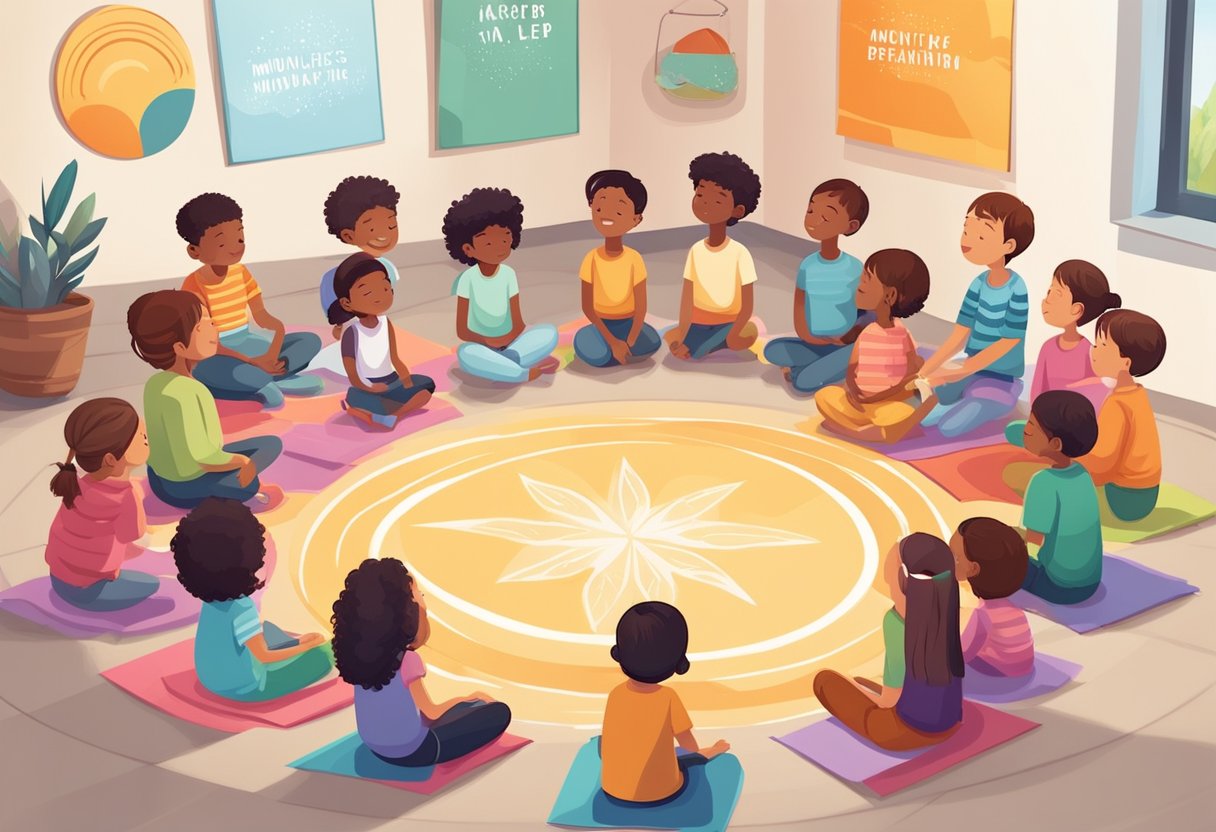
One way to introduce the concept of mindfulness to children is through quotes that encapsulate the essence of this practice. Quotes can be simple yet powerful tools in conveying complex ideas in an accessible manner. They serve as bite-sized wisdom that children can easily remember and reflect upon. This makes mindfulness quotes an effective educational resource, helping kids to internalize the practice and its benefits.
A collection of mindfulness quotes for kids often features sayings from a variety of sources, each selected for its ability to resonate with younger audiences. The quotes are crafted to inspire and motivate children to cultivate a mindful approach to life. By integrating these quotes into their daily routine, children have the opportunity to develop resilience and a more attentive and compassionate perspective towards themselves and the world around them.
Understanding Mindfulness

In the journey of fostering mindfulness in children, it is crucial to grasp its core principles and origins. Mindfulness encourages heightened awareness of the present moment and offers a way to navigate the flow of thoughts with greater ease.
The Essence of Mindfulness
Mindfulness is the practice of maintaining a moment-by-moment awareness of our thoughts, feelings, sensory experiences, and surrounding environment with an attitude of openness and curiosity. Key to this practice is the focus on breath, which acts as an anchor to the present moment, thereby grounding individuals in the here and now.
Early Concepts of Mindfulness
Historically, mindfulness finds its roots in ancient contemplative traditions, with a significant presence in Buddhist meditation practices. It involves observing the mind and body intentionally, without judgment, and embodies the concept that one can achieve clarity and insight by simply observing rather than reacting. Through such early teachings, it was understood that mindfulness allows one to appreciate the fullness of each moment, regardless of the simplicity or complexity of the experience.
Mindfulness Quotes Overview
Mindfulness quotes for kids are not just simple sayings; they encapsulate profound lessons that can help children navigate the complexities of their emotions and the world around them. They serve as accessible tools for children to learn and cultivate presence, awareness, and focus.
Influential Figures and Their Contributions
Dalai Lama: His messages often stress the importance of compassion and understanding in daily life.
Jon Kabat-Zinn: A pioneer in the field of mindfulness in the West, Kabat-Zinn’s quotes remind us of the power of being present. For example, his words, “Wherever you go, there you are,” highlight the concept of presence.
Amit Ray: He brings a perspective of mindfulness as a harmony amongst thoughts, words, and actions; a quote to share with kids would be “Mindfulness helps us to live in harmony with our thoughts, words, and actions.”
Buddha: Central to mindfulness, his teachings emphasize the significance of being mindful in each moment.
Thich Nhat Hanh: This Vietnamese Zen master’s words often provide simple yet profound guidance on the practice of mindfulness.
Sharon Salzberg: She is known for her approachable techniques in practicing mindfulness and her quote, “Mindfulness isn’t difficult, we just need to remember to do it,” speaks to the accessibility of mindfulness.
Pema Chödrön: Chödrön’s teachings help in understanding the benefits of meditation and mindfulness in difficult times.
What Makes a Good Mindfulness Quote
A good mindfulness quote for kids should be:
- Understandable: It needs to be clear and relatable to their level of understanding.
- Inspiring: The quote should encourage them to practice mindfulness.
- Memorable: Simplicity and imagery can make it easier for kids to remember.
For instance, phrases like “You are braver than you believe, stronger than you seem, and smarter than you think,” attributed to Christopher Robin, help children grasp the concept of inner strength and self-belief.
Applying Mindfulness to Child Development
Integrating mindfulness into child development enhances focus and nurtures positive emotional growth. Through structured practices, children can experience an increase in compassion, gratitude, and happiness in their daily lives, enabling them to thrive.
Mindfulness in Daily Life for Kids
Children can incorporate mindfulness into their daily routines through simple practices. For example, they can begin their day with a few minutes of deep breathing or engage in a short guided meditation. These methods help in setting a calm tone for the day, resulting in improved attention at school and in other activities. They might also recite affirmations that promote gratitude and kindness, such as “I am thankful for my friends and family” or “I choose to be kind to everyone I meet.”
- Breathing exercises: Encourage them to take deep breaths to center themselves before challenging tasks.
- Mindful eating: Teach them to savor their food, which can promote healthy eating habits.
- Gratitude journaling: A few minutes each evening penning down things they are grateful for can foster positive thinking.
Building Blocks of Emotional Growth
Practices such as mindfulness teachings instill valuable life skills that contribute to a child’s emotional maturity. By recognizing their emotions, children learn to respond rather than react to challenging situations. Mindfulness equips them with the ability to approach life with a sense of clarity and calmness.
- Emotion identification: Regular discussions about emotions can help kids label and understand their feelings.
- Role-playing: This can help children practice compassionate responses in various social scenarios.
- Celebrating small wins: Acknowledging efforts and achievements can build self-esteem and happiness.
Embodying mindfulness principles in their formative years sets the foundation for children to grow as well-rounded individuals, preparing them for the complexities of life while nurturing an innate capacity for joy and contentment.
Breathing Exercises and Quotes
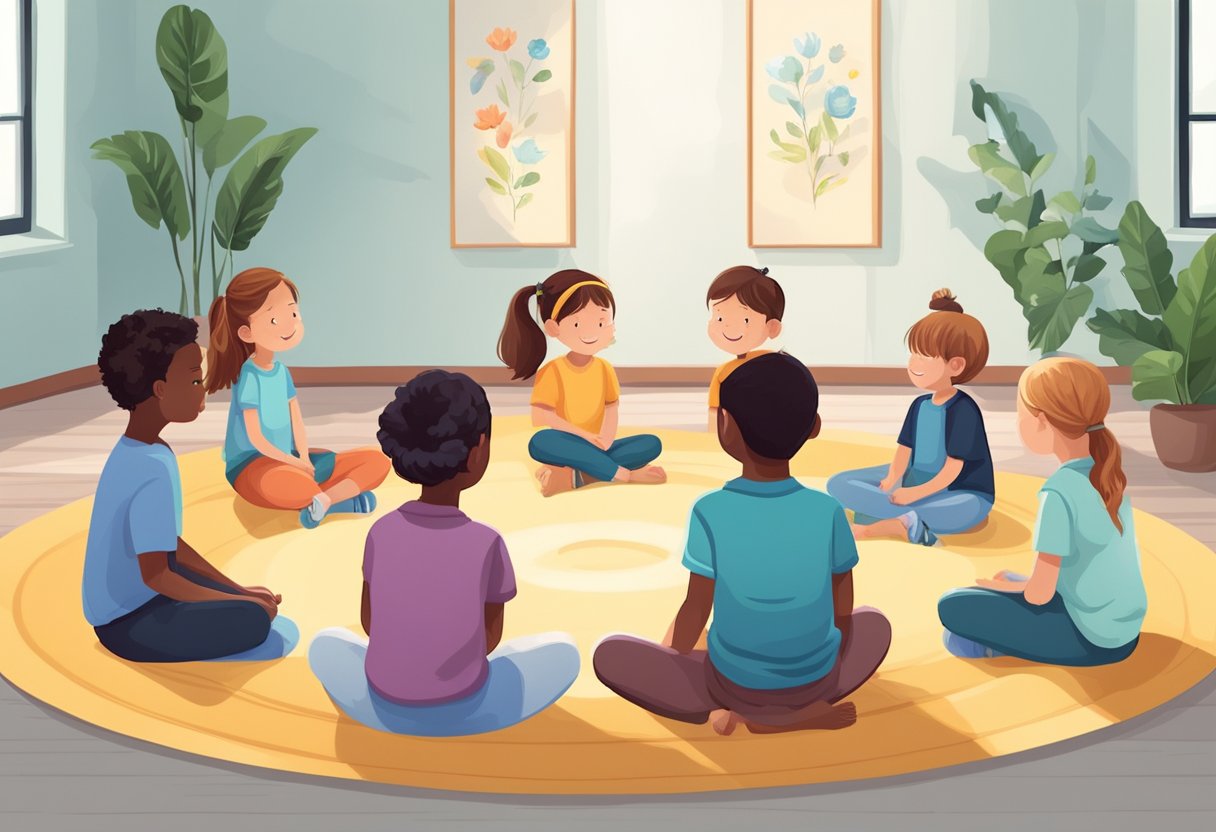
Integrating breathing exercises into a child’s daily routine can significantly aid in fostering calmness and staying present. These practices offer tangible methods for relaxation that children can access at any time.
Breath Awareness Practices
Breathing exercises for children should be simple, brief, and engaging. One effective technique is Counted Breath: children inhale slowly while counting to three, pause, and exhale on the count of three. This exercise not only introduces them to breath awareness but also serves as a tool for relaxation.
Another exercise is the Balloon Breath:
- Have children place their hands on their belly.
- As they breathe in deeply, they imagine their belly as a balloon inflating.
- On exhaling, the balloon deflates.
These methods help children learn how to calm their minds and bodies, empowering them to stay present in the moment.
Quotes to Breathe By
Supporting the practice of mindful breathing with quotes can reinforce its importance. Thich Nhat Hanh reminds us, “Conscious breathing is my anchor,” highlighting the grounding effect of breath awareness. Another quote to inspire kids is by Sharon Salzberg, “Mindfulness isn’t difficult, we just need to remember to do it.” These quotes can serve as prompts for children to engage in mindful practices throughout their day.
Guided Imagery and Visualization
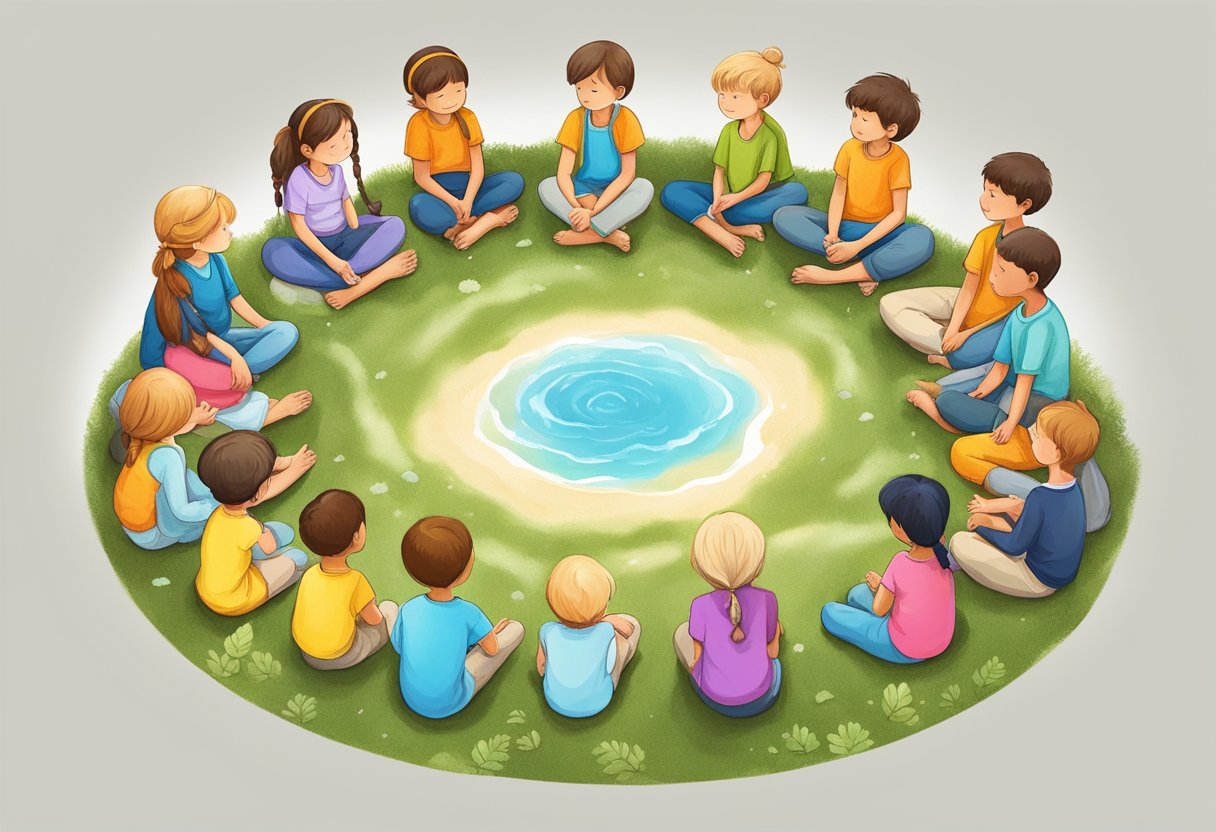
Guided imagery and visualization are powerful practices that leverage the imagination to inspire creativity and foster a connection with nature. These tools enhance a child’s ability to listen to their inner voice and draw upon the soothing aspects of natural elements like clouds and waves.
Mindful Quotes for Creativity
- “Imagine you’re a cloud, ever-changing and free, creating new shapes and ideas.” This quote encourages children to embrace the transformative aspect of clouds in the art of visualization, instilling a sense of creativity and the ability to adapt to new forms.
- “Your thoughts are like paintbrushes, and your mind a canvas; paint with bold and vibrant hues.” Such a quote captures the essence of creating vivid mental images, urging kids to use their internal resources to color their world imaginatively.
Nature and Imagination
- “Let the rolling waves carry your thoughts to creative shores.” Here, the likeness of waves to the rhythm of thoughts underscores how elements of nature can guide children toward imaginative exploration.
- “In every rustle of leaves, there’s a story waiting to unfold.” Through this imagery, children learn that nature holds endless tales, encouraging them to listen closely and use their imagination to perceive the world.
Mindfulness and Education
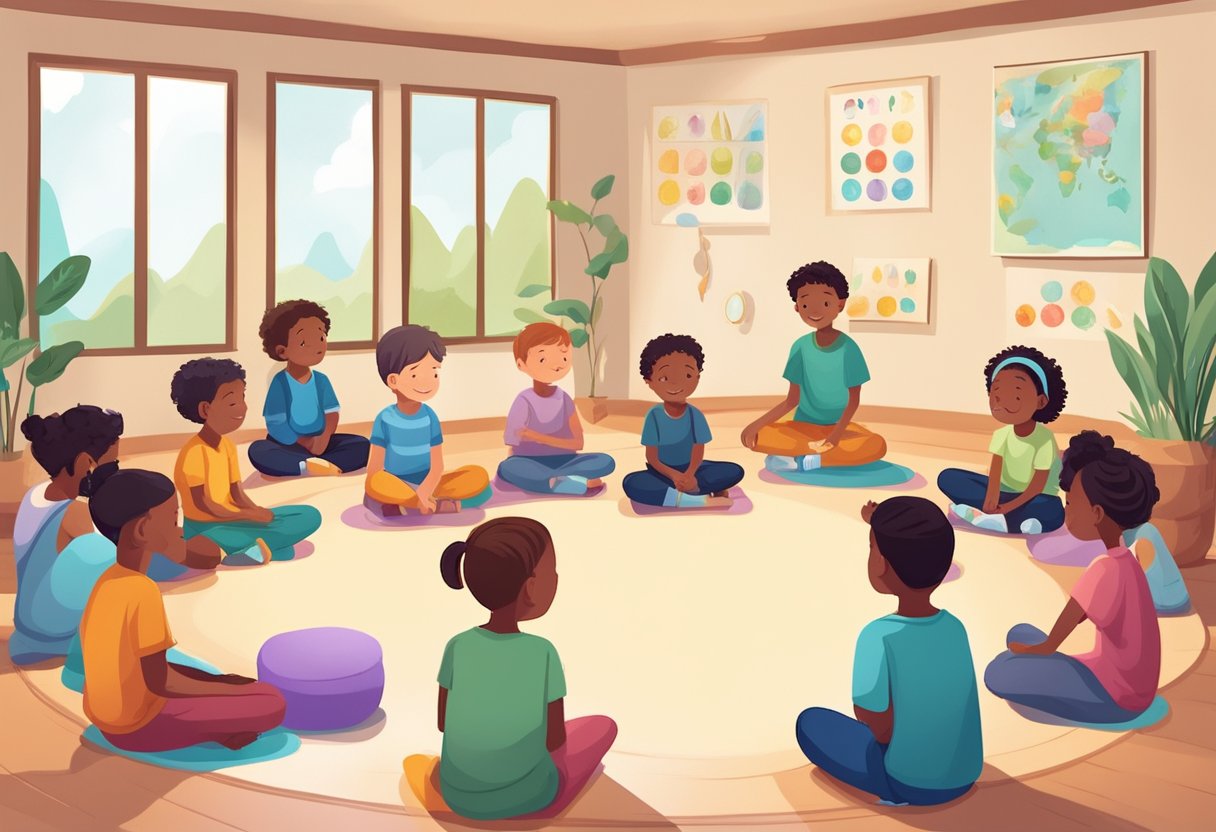
Incorporating mindfulness into education can significantly enhance students’ learning, confidence, focus, and concentration abilities. Strategic use of specific mindfulness quotes can foster greater curiosity and engagement with educational material.
Integrating Mindfulness Into Learning
Integrating mindfulness into the learning process can be achieved through various practices designed to improve concentration and create a calm learning environment. For instance, schools might begin classes with a short mindfulness exercise aimed at calming the mind, which can help students become more attentive and ready to absorb new information. Mindful breathing, a simple yet effective technique, can assist students in managing stress and maintaining focus on their studies.
Quotes That Encourage Curiosity
Quotes can serve as powerful tools for encouraging curiosity in students. They can be thought-provoking and inspirational, prompting students to explore concepts deeply. Consider using a quote like, “How you look at it is pretty much how you’ll see it,” by Rasheed Ogunlaru to remind students that perspective is paramount in both learning and mindfulness. Encouraging children to reflect on such quotes can instill a sense of inner motivation and increase their confidence to inquire and learn.
Mindfulness Activities for Children
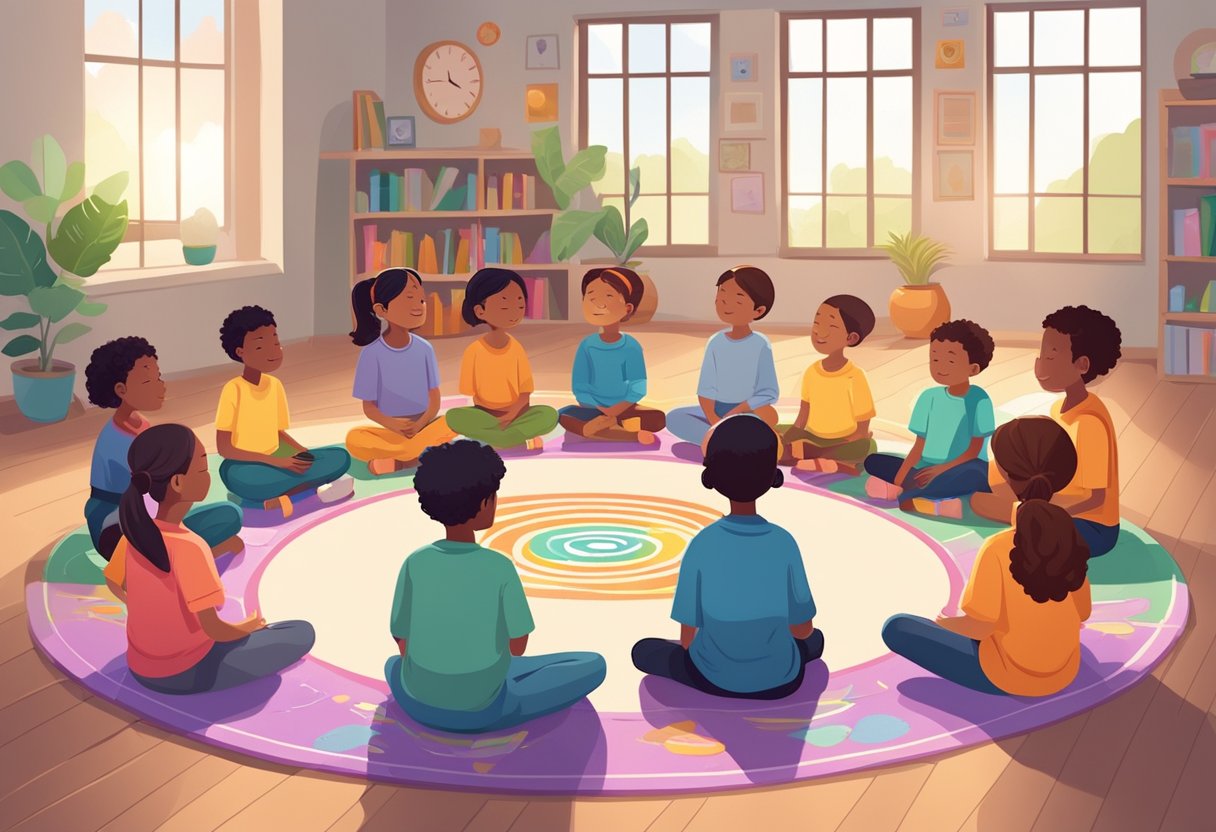
Incorporating mindfulness into a child’s daily routine can nurture their sense of joy, love, and kindness. Mindfulness quotes serve as simple reminders, anchoring these values into everyday practices and interactions.
Quotes for Everyday Practices
- Breath as an Anchor: “Conscious breathing is my anchor.” — Teaching children to focus on their breathing can bring a sense of calm and help them stay grounded in the present moment.
- Embracing Joy: “Think happy thoughts.” — Peter Pan. Encouraging kids to reflect on joyful moments can elevate their mood and promote a positive mindset throughout their day.
- Love for the Moment: “The little things? The little moments? They aren’t little.” — Jon Kabat-Zinn. This quote can inspire children to find love in the fleeting details of life, reinforcing the message that every part of their day is significant.
- Consistent Practice: “Mindfulness isn’t difficult, we just need to remember to do it.” — Sharon Salzberg. Reminding children that mindfulness can be simple and accessible empowers them to make it part of their daily routine.
Promoting Positive Interactions
- Kindness as a Guide: “Always let your conscience be your guide.” — Jiminy Cricket from Pinocchio. Exposing children to concepts of kindness and ethical behavior through quotes can guide their interactions with others.
- Learning from Others: “If we learn to open our hearts, anyone, including the people who drive us crazy, can be our teacher.” — Pema Chodron. This encourages children to approach their relationships with an open heart, recognizing the value in every individual.
- Spreading Love and Kindness: “The most precious gift we can offer others is our presence.” — Highlighting the importance of being fully present as an act of love and kindness during interactions teaches children to value the company of others.
The Role of Mindful Parenting
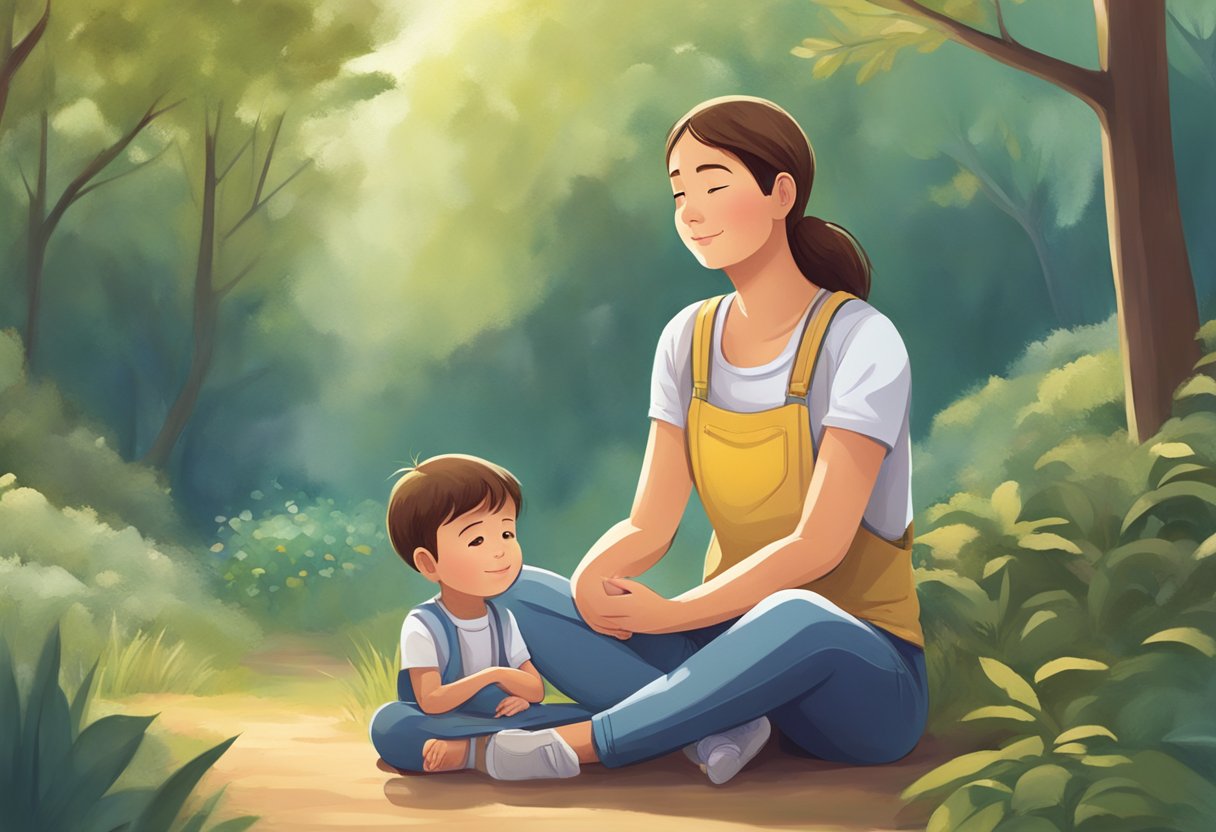
Mindful parenting involves a conscious approach to parenting that embodies understanding and nurturing to enhance the parent-child connection. It addresses stress and anxiety by fostering resilience and empathy, aiding in the navigation of life’s challenges.
Quotes to Foster Parent-Child Connection
Quotes can be powerful tools in strengthening the bond between parents and children. They serve as conversation starters and provide common ground for shared values and insights. For instance, a quote such as “Wherever you go, there you are” can be a simple reminder for both parent and child to be present in the moment with one another, reinforcing the importance of connection regardless of life’s distractions.
Examples of Quotes:
- “Patience is the calm acceptance that things can happen in a different order than the one you have in mind.” This quote underscores the virtue of patience in parenting—an essential trait for nurturing a strong bond with children.
- “Listening is where love begins: listening to ourselves and then to our children.” This emphasizes the value of active listening in creating a supportive and empathetic space for children.
Teaching Resilience and Empathy Through Quotes
Equipping children with resilience and empathy is a critical aspect of mindful parenting. Quotes can illustrate these complex concepts in a relatable way, helping kids understand and cultivate these qualities within themselves.
Selected Quotes:
- “You cannot stop the waves, but you can learn to surf.” This metaphor elegantly illustrates how one might face life’s challenges—by acknowledging stress and learning to navigate through it.
- “The best way to find out what we truly need is to get rid of what we don’t.” Through the process of elimination and understanding, children learn the value of resilience, discovering strength in simplicity and focus.
Celebrating Inner Calm and Peace
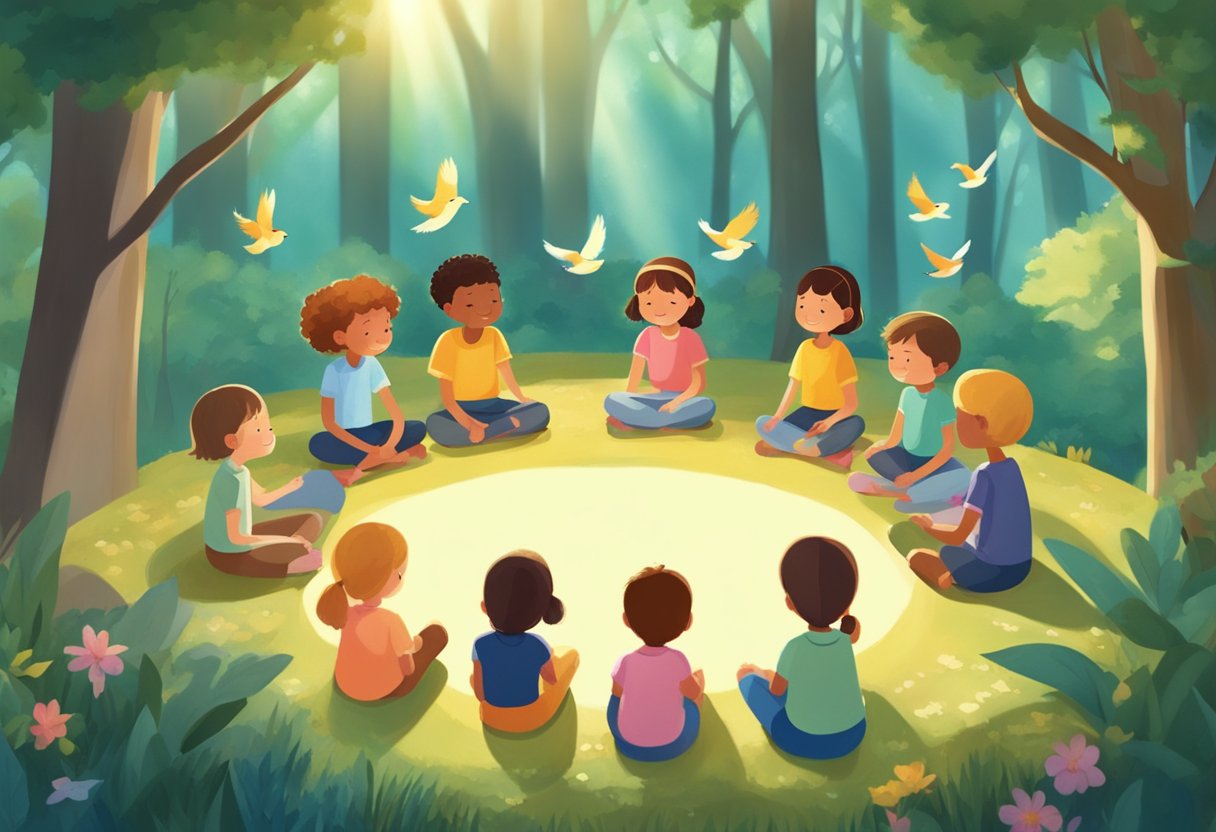
Mindfulness for children serves as a foundation for fostering inner peace and joy. It encourages a serene approach to life and helps young minds connect with their intrinsic wisdom. Through this, they can hear their inner voice, appreciate silence, and enhance their well-being.
Quotes on Peaceful Living
“Peace begins with a smile.” – Mother Teresa
This statement, found on the Quotes Toolbox, emphasizes the simplicity with which peace can radiate outward from a single joyful gesture. Instilling this outlook in children can be transformative.
- “Feelings come and go like clouds in a windy sky. Conscious breathing is my anchor.” – Thich Nhat Hanh
These words, also shared by the Quotes Toolbox, teach the importance of observing emotions without getting lost in them, a wisdom that can guide children toward tranquility even in the face of change.
Cultivating Inner Joy
“Be happy in the moment, that’s enough. Each moment is all we need, not more.” – Mother Teresa
The Quotes Toolbox highlights the wisdom of embracing present experiences for heightened joy and well-being, a valuable lesson for children who are learning to find happiness within.
- “Mindfulness isn’t difficult, we just need to remember to do it.” – Sharon Salzberg
Accessible through Parenting Nest, these words remind young ones that peace is always within reach and that mindfulness is a readily available tool for inviting joy and calm into their daily lives.
Inspiring Mindfulness Quotes from Various Thinkers

Considering mindfulness can be a universal tool for mental wellbeing, this section gathers powerful insights from philosophers, thought leaders, and modern voices. These quotes serve as a reminder for children to cultivate awareness, presence, and compassion in their daily lives.
Quotes from Philosophers and Thought Leaders
Throughout history, philosophers and thought leaders have shared wisdom that resonates deeply with the principles of mindfulness. Their words often inspire reflection and inner calm:
| Philosopher | Quote |
|---|---|
| Lao Tzu | “At the center of your being you have the answer; you know who you are and you know what you want.” |
| Rumi | “Yesterday I was clever, so I wanted to change the world. Today I am wise, so I am changing myself.” |
| Ralph Waldo Emerson | “For every minute you are angry you lose sixty seconds of happiness.” |
| St. Francis | “Where there is hatred let me sow love.” |
| Thích Nhất Hạnh | “The present moment is filled with joy and happiness. If you are attentive, you will see it.” |
| James Allen | “Cherish your visions; cherish your ideals; cherish the music that stirs in your heart.” |
Modern Voices on Mindfulness
In current times, various influential figures have embraced and spread the message of mindfulness, promoting its benefits to diverse audiences, especially children:
- Eckhart Tolle: “The past has no power over the present moment.”
- Deepak Chopra: “In the midst of movement and chaos, keep stillness inside of you.”
- Robin S. Sharma: “Everything is created twice, first in the mind and then in reality.”
- Jack Kornfield: “Mindfulness is about love and loving life. When you cultivate this love, it gives you clarity and compassion for life.”
- Anthony de Mello: “Happiness is our natural state. Happiness is the natural state of little children, to whom the kingdom belongs until they have been polluted and contaminated by the stupidity of society and culture.”
These voices, both past and present, provide children with a roadmap to cultivating a mindful and compassionate approach to life.
Closing Thoughts

Mindfulness quotes for kids offer more than mere words; they provide seeds of wisdom that can blossom into life-long coping skills. These simple sayings can lay the foundation for emotional resilience and enhance overall well-being when integrated into daily life.
Bringing It All Together
Mindfulness quotes serve as tools for children to bring their attention back to the present moment, fostering a sense of peace and focus. For instance, the insight that “everything is created twice, first in the mind and then in reality,” underlines the power of thought and presence. Integrating sayings like “The little things? The little moments? They aren’t little” into children’s daily life can shift their perspective to appreciate the now and find joy in the small details.
Continuing the Journey of Mindfulness
Encouraging children to carry mindfulness beyond fleeting moments is crucial. When kids grasp concepts like, “Your actions are your only true belongings,” they begin to understand the lasting benefits of being mindful in their actions. As children continue their journey, they cultivate habits that enhance not only their own overall well-being but also positively influence those around them. Mindfulness, inherently a singular practice, becomes a shared experience, resonating through their interactions and reactions.
